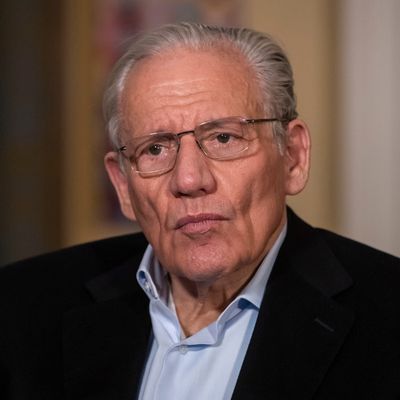
Last month, President Trump tweeted that Bob Woodward’s forthcoming book about his administration would be “fake.” (“The Bob Woodward book will be a FAKE, as always, just as many of the others have been.”) It’s not clear why Trump agreed to give Woodward several on-the-record interviews with himself and his top officials, because the last Woodward book had also enraged Trump by conveying his unfitness for office.
But it is clear why Trump felt obliged to instruct his supporters to ignore Woodward’s revelations, the recordings of which he has released today. Even though it is perhaps metaphysically impossible to devastate Trump’s reputation — at some point there’s no lower bottom that can be reached — it still manages to yield a series of shocking confessions from the mouths of the president and his handpicked team.
1. “I wanted to always play it down.”
Trump clearly followed a strategy of misleading the public about the threat of the coronavirus, believing that he could sustain the illusion that it would barely impact the country, and keep the economic recovery going. Woodward has Trump contemporaneously admitting he knew full well that the coronavirus is a serious threat. “This is deadly stuff,” he told Woodward on February 7. Even a month later, Trump was saying in public that the virus was nothing to worry about:
And he confesses that he misled the public. “I wanted to — I wanted to always play it down,” he says in recordings. “I still like playing it down because I don’t want to create a panic.”
Trump’s mishandling of the coronavirus is not merely a matter of administrative incompetence. It is a scandal. Woodward’s interview adds to the substantial reporting that Trump deliberately misled the country and continues to do so.
2. “Putin had something on Trump.”
Dan Coats, Trump’s first director of National Intelligence, had “the secret belief, one that had grown rather than lessened, although unsupported by intelligence proof, that Putin had something on Trump.” He believed, “How else to explain the president’s behavior? Coats could see no other explanation.”
That Putin had something on Trump during the campaign is not conjecture, but established fact. Trump was negotiating for a Moscow tower deal that promised to deliver him tens of millions of dollars in profit as zero risk, while he publicly denied at the time having any business dealings with Russia — a lie Putin could have exposed. Both the New York Times and former FBI agent Peter Strzok recently reported that Robert Mueller never conducted a counterintelligence investigation, or examined Trump’s financial dealings with Russia, focusing narrowly on violations of criminal law.
Coats’s suspicions do not prove that there is more compromising information that explains Trump’s deference to Vladimir Putin. It is newsworthy, however, that a Trump-appointed official believed what Trump and his fans dismiss as a conspiracy theory.
3. “I’m not feeling any love” from Black people.
At one point, Woodward tries to relate to Trump, as a fellow 70-something white man who grew up in comfort, that they have to work to understand the perspective of Black people who have less privilege. Woodward tries to present it in the most sympathetic way possible:
“Do you have any sense that that privilege has isolated and put you in a cave to a certain extent, as it put me, and I think lots of white, privileged people in a cave. And that we have to work our way out of it to understand the anger and the pain, particularly Black people feel in this country. Do you feel —”
Trump dismisses the idea out of hand: “No. You really drank the Kool-Aid, didn’t you? Just listen to you. Wow. No, I don’t feel that at all.”
Trump proceeds to complain that, despite having allegedly done more for Black America than any president since Lincoln, they remain ungrateful: “I’ve done a tremendous amount for the Black community. And, honestly, I’m not feeling any love.”
It is a mystery.
4. “I have built a nuclear — a weapons system that nobody’s ever had in this country before.”
Trump, who cannot control his impulse to boast about his access to secret information, tried to impress Woodward by referring to a still-secret technology. “I have built a nuclear — a weapons system that nobody’s ever had in this country before,” Trump said. Woodward reports that other sources “confirmed the information, without providing further details, but expressed surprise that Trump disclosed it.”
5. “I’m the only one he smiles with.”
Trump is known to adore dictators, especially Putin, but his susceptibility to flattery has made him adore several others who appear to be following Putin’s strategy. Trump boasts to Woodward that Kim Jong-un addressed him as “Excellency.” He brags, falsely, that “I’m the only one he smiles with,” as if this would indicate something positive about Trump’s negotiating style if true. He says he was awestruck at meeting the diminutive, rotund North Korean hermit-dictator, saying he said to himself, “Holy shit,” when he first found himself in Kim’s presence, and assessed his counterpart as “far beyond smart.”
Trump tells Woodward that he does not consider Obama to be smart, and adds that Kim considered Obama an “asshole.” The fact that Trump would not only take the assessment of a questionably sane third-generation tyrant of the world’s worst hellhole as if it added value, but also assume that Woodward would also be impressed to hear that Kim shares his assessment, reveals an astonishing lack of sophistication.
At one point, Trump seems to understand that he gets along well with dictators, and terribly with democratically elected officials, but does not understand why: “It’s funny, the relationships I have, the tougher and meaner they are, the better I get along with them. You know? Explain that to me someday, okay?”
It is a mystery.






























